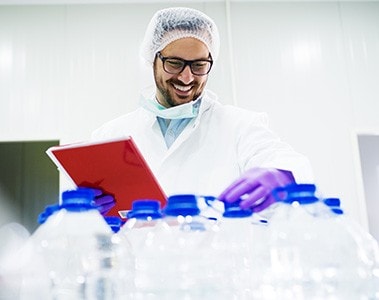
Factbooks
DSM's Factbook provides investors and analysts with an introduction to the company and our key individual businesses.
With the scientific resources and knowledge at our disposal, DSM has a unique opportunity right now to influence and shape the sustainability agenda. But of course we cannot do it alone. We encourage our people to get involved in sustainability on a personal level through their professional and personal networks; while on an organizational level we work a hugely diverse range of like-minded people - from the United Nations, to governments, NGOs, academia and other private companies.
Accounting for Sustainability (A4S) seeks to inspire action by finance leaders to drive a fundamental shift towards resilient business models and a sustainable economy.
To enhance sustainability within the supply chain, leading chemical companies including DSM have joined forces in the Together for Sustainability (TfS) initiative. TfS aims at developing and implementing a global supplier engagement program that assesses and improves sustainability sourcing practices, including ecological and social aspects.
DSM is a signatory to the United Nations Global Compact. The Global Compact is an international initiative that brings companies together with UN agencies, labor and civil society organizations to support universal environmental and social principles. It seeks to promote responsible corporate citizenship so that business can be part of the solution to the challenges of globalization.
The World Business Council for Sustainable Development (WBCSD) is a CEO-led, global coalition of companies advocating for progress on sustainable development. WBCSD aims to galvanize the global business community to create a sustainable future for business, society and the environment. The Council applies thought leadership and advocacy to generate constructive solutions and take shared action to drive business action on sustainability in the coming decade and beyond.
The result of a collaboration between the UN Entity for Gender Equality and the Empowerment of Women (UN Women) and the United Nations Global Compact, the Women's Empowerment Principles (WEP) are a set of principles for business offering guidance on how to empower women in the workplace, marketplace and community. DSM is a signatory to the ‘CEO Statement of Support’ for WEP, signaling our support for gender equality and the guidance provided by WEP.
The World Economic Forum (WEF) is committed to improving the state of the world and is the International Organization for Public-Private Cooperation. WEF engages the foremost political, business and other leaders of society to shape global, regional and industry agendas and is independent, impartial and not tied to any special interests.
The China Business Council on Sustainable Development (CBCSD) was founded in October 2003, and is a coalition of leading Chinese and foreign enterprises registered and operating in China, established through the Chinese Ministry of Civil Affairs. CBCSD provides a platform for exchange and cooperation among corporations, governments and social communities aimed at facilitating the development of sustainable business.
As the voice of the European chemical industry, Cefic (European Association of Chemical Companies) represents the 29,000 chemical companies in Europe, interacting on their behalf with international and EU institutions, non-governmental organisations, the international media, and other stakeholders.
The Dutch Sustainable Growth Coalition (DSGC) brings together eight Dutch multinational companies including DSM. The DSGC’s shared belief is that financial and economic growth is directly related to social and environmental return and it is committed to the SDGs. The DSGC develops sustainable business models to realize the SDGs, it shares its knowledge with other companies and students and it stimulates others to do the same.
EuropaBio's (European Association for Bioindustries) mission is to create an innovative and dynamic biotechnology-based industry in Europe. EuropaBio members are involved in research, development, testing, manufacturing and commercialisation of biotechnology products and processes.
FEFANA is the EU Association of Specialty Feed Ingredients and their Mixtures, and has developed a strong base to serve the industry in many fields such as regulation, research and policies. FEFANA aims to ensure that feeders, farmers, regulatory authorities, consumers, research organisations, journalists, and others are correctly informed about the use, safety and benefits of specialty feed ingredients.
scienceindustries is the Swiss business association for the chemical, pharmaceutical, biotech and other science-based industries operating in Switzerland. scienceindustries is a leading member of economiesuisse, the umbrella organization of the Swiss economy.
The Dutch Association of Investors for Sustainable Development (VBDO) works to create a sustainable capital market that considers not only financial criteria, but also non-financial, social and environmental criteria. VBDO’s vision is to increase sustainability awareness among companies and investors.
The Association of the Dutch Chemical Industry (VNCI) promotes the collective interests of the chemical industry in the Netherlands by means of consultations, meetings and recommendations. The VNCI acts as a central contact point and undertakes activities that have a positive impact on the image of the chemical industry.
The Confederation of Netherlands Industry and Employers (VNO-NCW) represents the interests of Dutch business and industry and strives to represent its members' interests by promoting a high quality business environment and investment climate in the Netherlands, with a view to boosting the competitiveness of Dutch industry. VNO-NCW's involvement extends to matters relating to education, infrastructure, public finances, taxation, the environment and social security.
BIO is the world's largest trade association representing biotechnology companies, academic institutions, state biotechnology centers and related organizations across the United States and in more than 30 other nations. BIO members are involved in the research and development of innovative healthcare, agricultural, industrial and environmental biotechnology products.
We work every day with customers on new sustainability ideas and initiatives with the potential to create value for everyone – in everything from the co-development of products (especially our Brighter Living Solutions), to disclosure of sustainability declarations, testing methodologies, and joint research and communications.
Replacing salt in our diets without reducing the taste can be tricky - which is why we invented Maxarome®, a 100% natural yeast savory taste enhancer. In a scientific study conducted in partnership with Unilever we successfully replaced 25% of the salt content in soup with the highly concentrated Maxarome (which represented just 1% of the total recipe). The result: food that tastes good while benefitting health.
We work with customers and all kinds of other organizations to combat malnutrition and tackle disease. We’re a long-term strategic partner to the UN World Food Programme in the supply of micronutrient powders and supplements for fighting what we call ‘hidden hunger’; and we also distribute micronutrients through other commercial channels - for example to the South African Department of Health and its patients. Meanwhile, in Asia we found a way to develop fortified rice kernels with the look and taste of normal rice (historically a major barrier to take-up) and are now looking to expand this further afield.
When our customer Nestlé was as interested as ourselves in measuring the environmental, social and health impacts of a fortified milk product in Asia, we joined forces. The resulting project led not only to greater insights and recommendations for developing more sustainable products; but also to better integration of sustainability into innovation and communication. As Anne Roulin, Global R&D Sustainability Manager Nestlé commented "The collaboration supports a mutual cross-fertilization of ways of working in the area of sustainability and innovation, beneficial for the early identification of new opportunities as well as mitigation of areas of risk".
A strong, sustainable – and circular – value chain is only as strong as its weakest link. Which is why we work with our suppliers to make it a reality – in everything from packaging and logistics to reducing raw materials and carbon emissions.

DSM's Factbook provides investors and analysts with an introduction to the company and our key individual businesses.

We work tirelessly to manage and minimize all possible adverse effects of our products on people and the environment, across the entire value chain.

DSM's position on the current defining issues across our business.